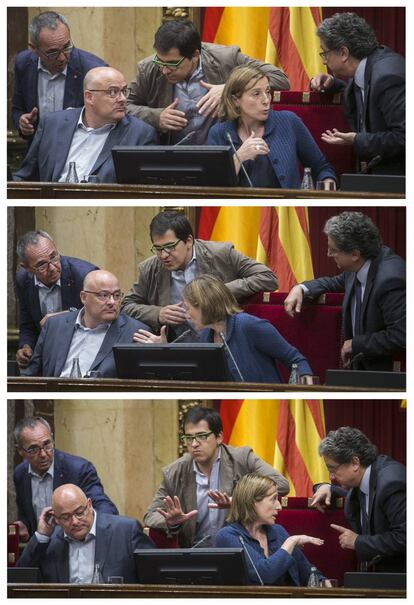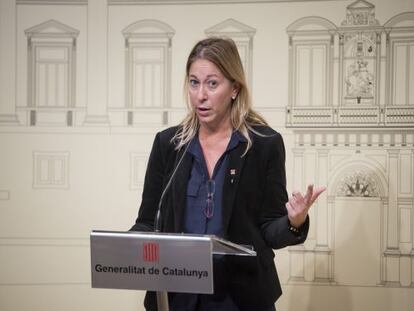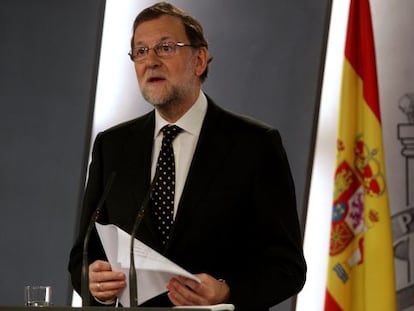Catalan parliament steps up pressure on Madrid over independence bid
Pro-sovereignty parties take advantage of their absolute majority to advance in their challenge of Spain's Constitutional Court


Catalonia's pro-independence parties, which control the region's parliament, have upped the stakes in their ongoing conflict with the central government and the country’s Constitutional Court by pushing through a vote to help begin a process of separation from Spain.
At a rowdy debate in the regional parliament, the pro-independence Together for Yes coalition and the far-left Popular United Candidacy (CUP) garnered support for the creation of “a unilateral mechanism” to “activate a Constituent Assembly" that would draft a Catalan Constitution after the region "disconnects with the laws of the Spanish state by passing disconnection laws."
This initiative made it through the regional house by 72 votes to 11 after Popular Party and Ciudadanos representatives walked out in protest, calling the vote "illegal", while the Socialists (PSOE) abstained.
The vote builds on a landmark motion passed by the Catalan parliament on November 9 to start breaking away from Spain. Since then, separatists have been developing regional legislation and legal mechanisms to make that happen regardless of what the Spanish courts may rule regarding their constitutionality.
Responding to the vote, Deputy Prime Minister Soraya Sáenz de Santamaría reiterated the government's position that it woud not allow the Catalan parliament to go through with its independence plans: “Today another very serious and obstinate decision has been taken, one that infringes the right of all Spaniards to decide their constitutional framework. The government has said it will act, has been acting and will act.”
The government of Mariano Rajoy dismissed November's referendum in which more than two million people took part as a propaganda exercise
Socialist Party leader Pedro Sánchez, described the Catalan parliament’s decision as“extremely serious” noting that it had once again disregarded the rulings of the Constitutional Court.
“No one has the right to put institutions beyond the law. These decisions violate the constitution and Catalonia’s statutes,” he said.
The regional parliament of Catalonia, effectively controlled by Together for Yes and CUP, which emerged victorious after September’s elections, has steadily been working to create the legal apparatus required for independence, including a tax agency, social security system and a foreign affairs department. Together for Yes wants to call a second independence referendum toward the end of next year.
Regional premier Carles Puigdemont, who supports independence, will be putting himself to a confidence vote on September 28 on the issue of sovereignty. Puigdemont rose to the premiership in an eleventh-hour assembly vote in January of this year, three months after Catalans had gone to the polls.
His predecessor, Artur Mas, initially cautious over independence, fell out with Rajoy during his own term in office, which was marked by an informal independence referendum held on November 9, 2014.
Rajoy held his last meeting with Mas in late July 2014. All contact was severed after that, and the Catalan premier fully embraced the independence movement from that point onward.
Sign up for our newsletter
EL PAÍS English Edition has launched a weekly newsletter. Sign up today to receive a selection of our best stories in your inbox every Saturday morning. For full details about how to subscribe, click here
By the time Mas was replaced at the helm of the Catalan government by Puigdemont (after failing to secure enough parliamentary support to get himself reinstated, a position that Rajoy now finds himself in at the national level) relations were so strained that even a telephone conversation was out of the question.
In April, Rajoy and Puigdmont chatted for more than two hours at the Moncloa palace official residence. At the press conference afterwards, Rajoy gave a press conference dotted with expressions such as “dialogue,” “working together” and “together, we are all winners.”
But since then, there has been no further contact, with the Together for Yes coalition and the Popular United Candidacy pushing ahead with the independence process.
Deputy Prime Minister Soraya Saénz de Santamaría said on Wednesday that the government would appeal to the Constitutional Court.
Within Catalonia itself support seems to be growing for independence. A poll earlier this month for the first time directly asked Catalans if they supported independence, with 47.7% of respondents saying they wanted to separate from Spain, while 42.4% were against it, with 8.3% undecided.
In November 2014, the regional government of Catalonia organized a non-binding referendum that posed two questions: whether Catalonia should be a state, and if so, if that state be independent. More than 80% of people voted yes to both.
The government of Prime Minister Mariano Rajoy dismissed the referendum as a propaganda exercise. Around two million people took part in the vote, which was open to residents aged 16 and over. Some 5.4 million people are eligible to vote in Catalonia.
English version by Nick Lyne.
Tu suscripción se está usando en otro dispositivo
¿Quieres añadir otro usuario a tu suscripción?
Si continúas leyendo en este dispositivo, no se podrá leer en el otro.
FlechaTu suscripción se está usando en otro dispositivo y solo puedes acceder a EL PAÍS desde un dispositivo a la vez.
Si quieres compartir tu cuenta, cambia tu suscripción a la modalidad Premium, así podrás añadir otro usuario. Cada uno accederá con su propia cuenta de email, lo que os permitirá personalizar vuestra experiencia en EL PAÍS.
En el caso de no saber quién está usando tu cuenta, te recomendamos cambiar tu contraseña aquí.
Si decides continuar compartiendo tu cuenta, este mensaje se mostrará en tu dispositivo y en el de la otra persona que está usando tu cuenta de forma indefinida, afectando a tu experiencia de lectura. Puedes consultar aquí los términos y condiciones de la suscripción digital.










































